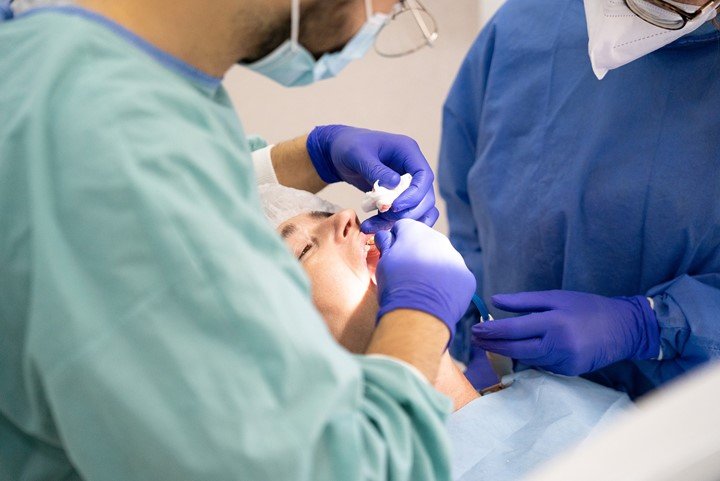Changes in dental technology and specialists’ help have solved dental challenges faced by thousands of people. Clear choice dental implant focuses on a combination of four dental implants. The implants are normally made of titanium and are fused to a living bone.
Pros of clear choice dental implants
1. Permanent dental solution that lasts a lifetime: Clear choice dental implants normally last up to 25 years and may last a lifetime with proper care.
2. No slipping or adhesive required when new teeth are fixed: Unlike conventional dentures, which require adhesive to be anchored, dental implants work similarly to the roots of natural teeth; hence, there is no need for adhesives.
3. Preservation of the bone and maintained facial structure: Clear choice dental implants prevent bone loss in the face and jaws through a process known as osseointegration. Dental implants give the same support to the face as natural teeth, therefore, preventing alteration in the shape of your face. After losing teeth, you lose the support provided by the jaws, which leads to a change in the shape of your face.
4. You get to have teeth that resemble and function like natural teeth: You get to have an improved appearance besides having teeth that work similarly to normal teeth. It is because implants are permanent, unlike removable dentures.
5. Good oral health: Unlike a tooth-supported bridge, dental implants don’t need to reduce other teeth. With most of the nearby teeth left intact, it helps maintain oral health for a longer period. Dental implants also allow easy access between teeth, therefore, helping to improve oral hygiene.
6. Reliability and comfort: Unlike removable dentures, which are quite uncomfortable, dental implants are most reliable as you feel they are part of you.
7. Easy in taking meals: Removable dentures can make chewing a great challenge. Dental implants function similarly to normal teeth allowing one to take meals with confidence and comfort.
8. Improved speech: Unlike dentures which might slip, causing one to mumble, dental implants allow one to speak confidently without the worry of teeth slipping off the position.
9. Improved self-esteem: You get to have a better smile the same day as the procedure, which boosts your self-esteem, and you feel better about yourself
10. A requirement of four dentures: You may need a minimum of four implants for a full arch of both upper and lower jaws. A full arch of both upper and lower jaws may range from 12-16 implants with 4-8 at the top and vice versa. However, only four implants can be inserted, although it depends on the dental bone mass available.
11. Easy to take care of them: Unlike removable dentures requiring much attention and care, dental implants don’t need to purchase any special products to clean or take care of them. You clean them as you would with your normal teeth.
12. Support to nearby teeth: A gap left between the teeth resulting from the loss of teeth may cause teeth on either side to change in position, causing misalignment. Dental implants provide support to other teeth by filling the gap
13. Improved biting force: A great advantage of dental implants is that they are placed inside your jaws with titanium support that acts as the root of the teeth. This allows one to have a greater biting force the same as that of normal teeth. It is quite different from removable dentures and other teeth replacement methods.
Cons of clear choice dental implants
1. Costly: Dental implants are quite expensive and can cost you quite a fortune. For example, a full month of dental implant coverage will cost tens of thousands of dollars, which your insurance most probably won’t cover.
2. Surgery is a requirement: It is obvious that dental implants need surgery to be placed, and with surgery comes several risks. The possible risks that occur with dental surgery include:
Damage to other teeth, jaw fractures, infection, delayed bone healing, nerve damage, and prolonged bleeding.
3. There might be a need for bone graft in some patients: Dental implants have the advantage of maintaining bone mass in the jaws. However, it is common to lose bone around implants. Therefore, results from normal bone loss over the years, hence the need to replace dental implants and bone grafting.
4. Contraindicated in some medical conditions: Dental implants have several contraindications. They include cerebrovascular accident, a recent myocardial infarction, bleeding disorder, and valvular prosthesis surgery. Also, immunosuppressive ailment and intravenous bisphosphate use.
5. A certain period of healing time before getting the new teeth: It is quite a major challenge with clear choice dental implants due to the long period it takes to heal. There are long hectic criteria used in dental implants starting from evaluating if you have enough bone mass in the jaws, all the way up to the healing of the gum, and finally, permanent teeth restoration. Those who have undergone bone grafts have to wait for their gums to heal to insert the dental implants. The healing of the gums can range from 3 to 18 months.
6. Need to replace your restoration: Dental implants can last for a lifetime. However, the restoration you attach to them may not last long. You will have to replace your restorations as time goes by, which can be quite expensive.
7. Room for error: There’s typically a fail rate of about 10% on dental implants, especially if not conducted by a specialist or expert.
8. Requires much time and effort: Normally, dental implant procedures can’t be completed within one dental clinic visit. There has to be an evaluation, then the actual time to heal before placing the permanent teeth, which requires much effort and time.
9. Fracture in the dental crown: Dental implant crown fracture is possible. In dental implants, the shock is directly transferred to the dental crown. It is because dental implants lack a shock absorber during biting instead of natural teeth that have the periodontal ligament.
10. Risk of infection: Without proper care of the dental implants, the plague could accumulate between them, leading to infection of the gums or bones.



